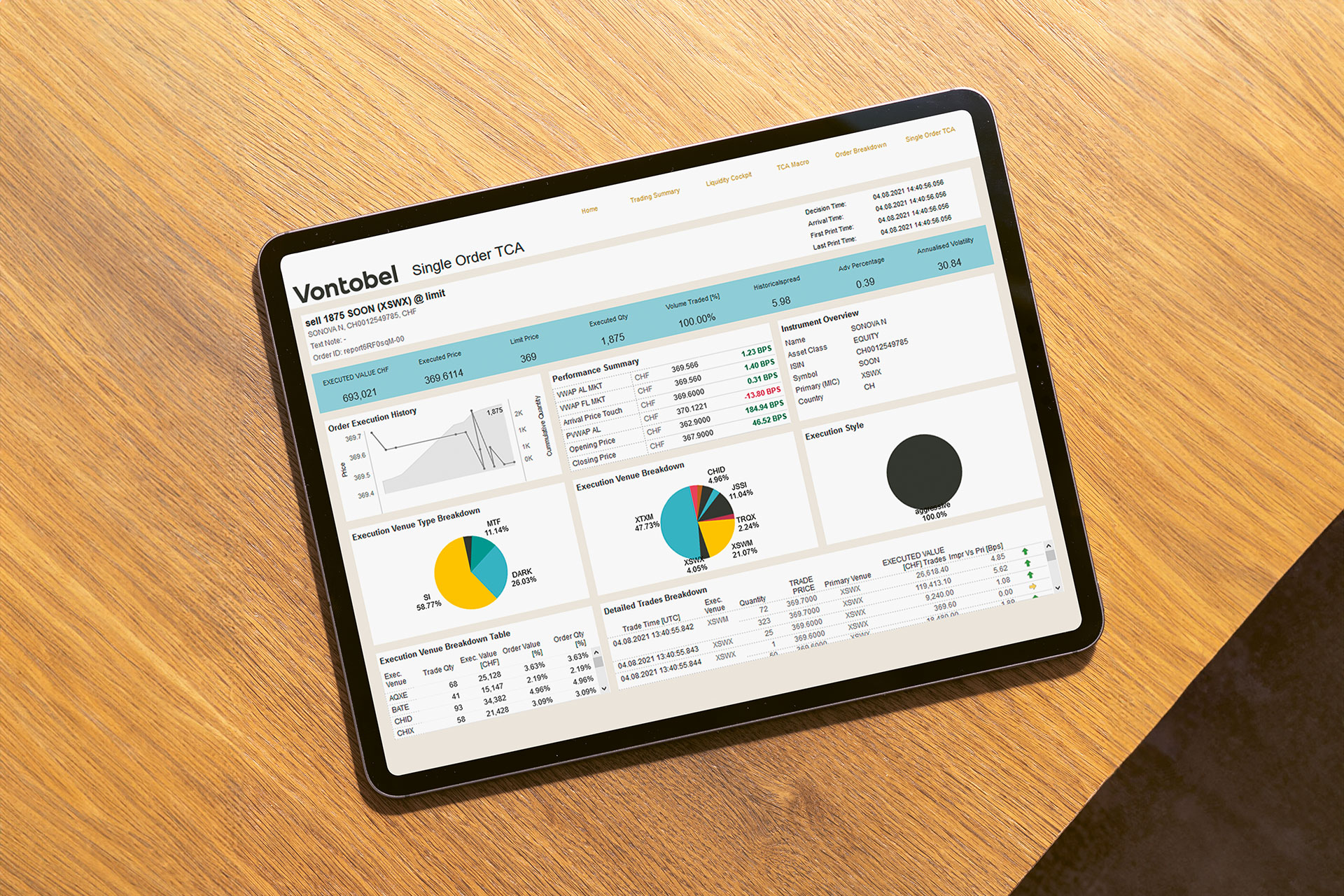
Vontobel @ TradeTech 2025
Publiziert am 20.05.2025 MESZ
Participating in TradeTech Paris this year was an opportunity to delve into the latest advancements in trading technology, a reminder of the swift evolution of our industry and the need to invest in the talents propelling this change. The Transaction Banking team left the event feeling inspired.
TradeTech emphasized the importance of AI integration and data-driven decision-making through engaging discussions. Panels on talent development and the future structure of trading desks revealed both the challenges and opportunities that lie ahead. Above all, the event highlighted the significance of networking, knowledge exchange, and promoting professional development among colleagues in an ever-changing landscape.
In recent years, we at Vontobel Transaction Banking have observed a substantial shift towards operations driven by data. The use of dashboards, post-trade analyses, and a close collaboration with data science teams have become the norm.
So, what exactly makes a successful trader in 2025? The shift has moved from purely quantitative expertise to a profound understanding of the market structure and regulatory landscape. Communication skills have become paramount - successful traders must have interpersonal skills and be good listeners. Building trust with Portfolio Managers and market participants is a crucial element to success.
We anticipate the following themes will significantly influence the future trading landscape:
Developing an expert team of traders
- Soft skills to hire by: Integrity, passion for markets, curiosity and adaptability.
- Hard skills to hire by: Quantitative skills, market knowledge and data competence.
- Measurement of success: While Transaction Cost Analysis (TCA) is utilized, it remains context-dependent and challenging to compare. Successful traders are problem solvers, show initiative, and possess the ability to work collaboratively in a team. We believe that value is progressively characterized by alpha retention and cost reduction - mere performance is insufficient. Mentoring and sponsorship play a pivotal role in promoting and retaining talent for the long term.
- Cross-Asset upskilling: Experts believe that there are lessons to be learned across bonds, FX, and equities in terms of capturing fragmented liquidity and optimizing execution.
Transaction Cost Analysis (TCA)
- Quality Considerations: High-touch orders frequently require manual interventions, such as Bloomberg chat or phone calls, which are not entirely reflected in TCA metrics.
- ML-Insights: Experts believe that merging traditional TCA with machine learning-driven clustering could uncover concealed cost patterns and minimize trader bias.
- Transparency: The prevailing opinion is that there will be an increased demand for integrated TCA tools with transparent, auditable workflows.
Role of AI
At present, AI's autonomous decision-making is minimal. Generative AI, such as ChatGPT Enterprise, is being utilized for data analysis, research, and efficiency enhancement. However, the outlook on integration is cautious due to regulatory requirements, with many companies still in the early stages of pilot phases. Most companies have established their own AI policies, with a focus on data sensitivity and transparent application.
- Adoption Gap: Only about 22% of attendees currently employ AI in trading, although many have projects planned for the next 12 months.
- Data-First Mindset: Participants believe that the principle of "garbage in, garbage out" still holds true—high-quality, integrated data is essential for effective AI.
- Use Cases: From pre-trade price optimization to post-trade analytics, the consensus is that AI can enhance decision-making if implemented alongside existing reinforcement cycles.
Market Opening Hours
The prevailing opinion is that 24/7 access is attractive to retail investors. However, institutional participants express caution regarding liquidity and operational risk outside of core business hours.
Regulatory Differences
In the United States, it is not uncommon to encounter advertisements for meme coins or overhear young individuals inquiring about the next cryptocurrency investment, often swayed by the influence of social media. Our industry, in contrast, is subject to stringent regulations, occasionally to the point of overregulation (just compare 401k vs EU pension funds). However, when it comes to safeguarding investors, financial products must suit the appropriate customer.
Banks are not only significantly constrained in their advertising efforts and target audience due to a plethora of regulations but more confronted with financial transaction taxes, stamp duties, and exchange fees. In contrast, cryptocurrency trading often circumvents these costs and is certainly less regulated. This disparity raises questions about the fairness and efficiency of our current financial systems.
In our perspective, the role of financial markets is clear as their fundamental purpose is to facilitate corporate financing, provide investors with easy access, and offer opportunities in a fair and transparent environment.
Trading Automation
Traders are increasingly turning to algorithms for both routine and complex orders, a trend that is anticipated to persist. We believe that the following topics are of importance:
- Client & Trader Education: Experts believe that many clients still fail to fully appreciate the value of technology investments—Expected Liquidity Premium and trajectory-crossing analytics are set to drive the next wave.
- Evolving Algo Wheels: Two trends have emerged: dynamic algo wheels that adjust the strategy mix throughout an order's lifecycle, and AI-driven wheels that continuously learn from execution outcomes. Experts believe that only a minority currently have live AI-powered wheels, but many are planning pilots in the upcoming year.
- Resource Constraints: The full rollout of automation is often slowed down by limited in-house expertise and budget pressures.
Conclusion
The panel agreed that technology—particularly AI and automation—holds substantial potential for optimizing execution. Experts believe that success depends on starting with clean data, selecting practical use cases, and constructing transparent, auditable workflows. The prevailing opinion is that, given the ever-changing regulatory landscapes and further fragmentation of market structures, firms that invest in scalable tech solutions will secure a lasting competitive advantage. Since 2015, Vontobel Transaction Banking has strategically invested in enhancing those capabilities.
Trading desks are experiencing a significant shift—from purely technical execution towards strategic integration, data-driven control, and a stronger influence on investment outcomes. Soft skills and cross-team communication are identified as key success factors. While AI is acknowledged as a crucial future topic, its implementation is currently approached with caution and is mostly outside of the core business.
Alles beginnt mit einem persönlichen Gespräch
Publiziert am 20.05.2025 MESZ
ÜBER DIE AUTOREN
 Weitere Artikel anzeigen
Weitere Artikel anzeigenMatthias Schiesser
Head of Distribution Electronic Trading Solutions
Matthias Schiesser leitet die Abteilung Electronic Trading Solutions im Bereich Transaction Banking bei Vontobel. Er ist verantwortlich für den Vertrieb der Low-Touch-Trading-Plattform, der Verwahrdienstleistungen, der Devisenprodukte und der Trading Analytics Platform™ (TAP) von Vontobel. Seine drei Teams Innovation Hub, Relationships und Salestrading bedienen 150 Institutional Clients im In- und Ausland.



